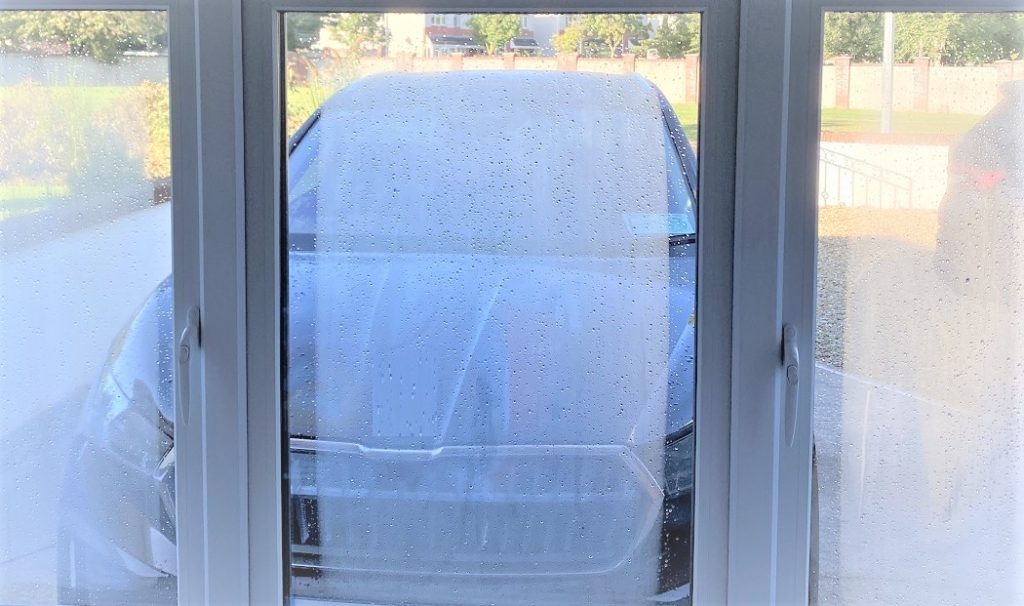Condensation
Condensation on windows throughout the world is a common problem. With the advent of double and triple glazing, this problem has been greatly reduced. It can be unsightly and unhealthy if not checked. The problem is not purely confined to windows, it can form on walls, ceilings and doors also. If your home is not properly heated and ventilated, then you are inviting this issue to occur.

External Condensation On Windows
This can be greatly reduced by talking to your local Weatherglaze Windows company and getting proper advice. There are many times when we get calls from customers who get condensation on the outside of their new double and triple-glazed windows. We can assure you that this is not a fault in the glass or your new windows. This is a sure sign your windows are working and doing the job they are supposed to be doing. Moisture is condensing on the cold surface outside because it’s way below the dew point. This normally goes away within a short period in the morning as the day heats up. The amount of moisture in the air varies at different times of the year, so nothing to worry about when you see condensation on the external pane of your glazed unit.

Room Temperature
When heating is switched on in a room, the inside surface of a triple or double unit is much warmer than the outside one. The likelihood of condensation forming internally is greatly reduced. This scenario will also be beneficial in the retention of heat in the room. Heat needs to be properly regulated for triple and double-glazed units to perform correctly. Remember condensation is formed when hot air meets a cold surface, so the double-glazed or triple-glazed units prevent conduction through the glass unit. You have less chance of condensation when you have a warm glass surface. It is also a good idea, to time your heating to come on for about 30 minutes throughout the night, as this prevents the internal pane of glass getting very cold. This reduces the issue of internal condensation.
Cause & Prevention
Condensation on the windows of your home is a normal phenomenon. It happens when there is too much moisture in the air, and it appears as water droplets on the outside or inside of your windows. When this condensation freezes, it can cause damage to the window by cracking and breaking it. In mild weather and moist climates, you may notice very few condensation droplets on the window pane. However, if you live in a dry area with warm temperatures and there are high levels of humidity outside, you will be prone to more frequent occurrences of this issue and damage to your windows.
Causes of condensation and mould on windows
Below are some of the causes why condensation on windows happens:
1. Poor ventilation
The most common cause of condensation on windows is inadequate ventilation. When there are high levels of moisture in the air, it can create a moist environment near the window and make it difficult for the room to get adequate ventilation. During cold winter mornings and nights, homeowners with central heating systems often find that their temperature rises too quickly. This creates a damp environment that makes the air feel moist, leading to condensation on windows.
2. An over-humidifier
During mild weather, it may not be always necessary to use an over-humidifier to create humidity in your home. However, if you are living in a climate where it is always hot and humid, you need to be sure that your humidifier is operating at high levels. If the humidity level of your home is too high and you don’t use an over-humidifier or make other adjustments to maintain a proper level of humidity, condensation on windows may occur.
3. Heat in winter
When the weather outside is very cold, it creates a cool environment for the interior of your home. This can mean that the air near your windows can feel cooler than normal. If you have poor insulation in your windows, the air can travel through them more easily and they will feel cool to your touch. This creates condensation on windows that can cause damage to the window and ice buildup. So, time your heating to come on at interval throughout the night.
4. Climate change
If you tend to have condensation on windows during very cold winters, there is a possibility that these occurrences will become more frequent as the climate changes and gets warmer overall. This can cause damage to the window and make you feel uncomfortable around it.
How to prevent condensation on windows
1. Use double and triple-glazed windows
The most effective way to prevent condensation on windows is to use double and triple-glazed windows. Not only will this help you save on your energy bills by reducing the amount of heat lost through your windows, but it will also reduce condensation build-up on them.
2. Get your windows professionally checked
If you notice that condensation on windows makes them look dull, take time to get them polished professionally so that the glass can be restored to its original condition. By getting your window professionally polished, you can help prevent more condensation from forming on them in future.
3. Adjust the temperature of your home
Perhaps you live in a warm climate and you have condensation on windows, consider raising the temperature in your home by one degree or two. If your air conditioner is adequately equipped, this will also help reduce the humidity level in your home. If this involves installing a new unit, it would be wise to get it professionally installed so that there are no problems with the installation process and proper function at the end of this.
4. Check your moisture levels
When you have condensation on windows, it is important to find out why they are forming. To do this, it is important to check the moisture levels in your house. The easiest way to do this is through a moisture meter that you can buy from an appliance store or the home section of some department stores.
5. Keep your home well insulated
If you live in a cold climate and have condensation on windows, consider increasing the insulation level of your home by adding more blankets and sheets over windows and doors. This is also an ideal way to save on heating costs during the winter months.
6. Mould In Rooms
This is a common problem during the winter months in Ireland. Most people sleep with the windows closed and there is a lot of moisture generated. Try and turn the heating on for 15 minutes per hour during the night so the temprature inside does not get to cold. Apply a little common sense in this instance.
Conclusion
Condensation on windows is a normal phenomenon in most homes and it is important to learn how to prevent them from forming. With little intervention, condensation on windows usually goes away quickly. However, if you notice that condensation is happening more frequently or causing cracks and damage to your window, you should contact professionals for help. Contact Weatherglaze Designs or Composite Door System
